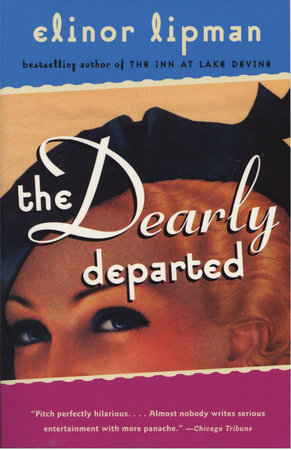The Dearly Departed Reader’s Guide
By Elinor Lipman


1. What physical characteristics or personality traits did Sunny inherit from her mother and father, who was presumably Miles Finn?
2. Regarding Fletcher and Sunny, Emily Ann observes, “Appearances aside, you two seem like complete opposites” [p. 190]. Do Sunny and Fletcher share any similarities other than their physical resemblance? How does each feel about discovering a new sibling? Does it mean more to Fletcher or Sunny? Why?
3. How does Lipman use physical surroundings to create a presence for Margaret and Miles despite their being deceased before the novel begins? [See, for example, the description of Miles’s cabin in Chapter 14 and the contents of Margaret’s house in Chapter 15.]
4. Sunny asks Joey: “Would a truly grief-stricken daughter go directly from the cemetery to the golf course? Or, between the wake and the funeral, give herself a pedicure” [p. 228]? Given the treatment of death and grief in the novel, how might these questions to be answered? Does Sunny handle her grief in an appropriate manner? A realistic manner?
5. A reviewer in The Atlantic Monthly noted, “Sunny learns a universal truth: Things get better after high school.” Do the memories of her high school harassment loom larger in Sunny’s mind than the facts support?
6. Is the grudge that Sunny holds against the high school boys’ golf team justified, or is Randy Pope fair in asserting that “some ladies roll with the punches. Some even laugh instead of carrying a grudge” [p. 137]?
7. In the small town of King George, everyone knows everyone else. This is highlighted best by Dr. Ouimet’s infuriating yet comical dilemma as he searches for someone in whom he can confide his feelings for Margaret: “Who in this town, be they counselor or clergy, wasn’t a patient?” [p. 215] How does Lipman paint life in King George and small town life in general?
8. About the golf course that was her backyard, Sunny says, “I know all the loopholes. All the best times to sneak onto the King George Links, virtually invisible” [p. 96]. And Sunny also comments about Margaret to Fletcher, “She was very conventional, and very worried about what other people thought. Above all else, she wanted to fit in” [p. 163]. As Sunny discovers, she was, and is, hardly invisible to the residents of King George. Moreover, her mother was somewhat less than conventional. In what other ways does The Dearly Departed explore this theme of appearance versus reality?
9. Joey’s mother hovers over and clearly adores her son. What does their relationship say about Joey, and how do his mother’s regular appearances advance the plot?
10. Despite their completely different upbringing, do Emily Ann and Sunny have anything in common? What significance do people’s socioeconomic backgrounds have in King George?
11. Who is the central character of The Dearly Departed? Do the actions of any one character dominate the plot? Does any one character’s viewpoint pervade the narrative?
12. Compare the characters who actively engage in life, such as Margaret, Randy Pope, Emil Ouimet, to those who choose to remain more passive, such as Regina Pope, Emily Grandjean, and Billy and Christine Ouimet. Into which category might Sunny, Fletcher, or Joey be placed? In The Dearly Departed, do people actually change, or is it just perceptions that change?
13. What role does dialogue play in The Dearly Departed? How do conversations reveal feelings and promote both character and plot development? What makes the conversations in the novel realistic?
14. Lipman has been called “a queen of verbal economy” (Boston Magazine). An example might be when we are told that Randy Pope, Sunny’s former archenemy, tracked down Margaret’s personal effects “in person, and found it misfiled in Concord” [p. 252]. Can you think of other examples of the author’s narrative shorthand?
15. Reviewer Maggie Galehouse writes, “If the cast of NBC’s Friends beamed into Thornton Wilder’s Our Town, the result might well be Elinor Lipman’s latest novel. Set in King George, N.H. (a town that rivals Grover’s Corners in size and sensibility), The Dearly Departed has the charm and economy of Wilder’s play, along with the quick-witted, intently quirky characters of a successful sitcom” (The New York Times Book Review, July 15, 2001). Is the comparison between The Dearly Departed and a television sitcom apropos? If you are familiar with the Thornton Wilder play Our Town, how is it similar to The Dearly Departed?
16. To what genre of literature does The Dearly Departed belong? Is there a theatrical or dramatic style to the novel?
17. Neal Wyatt remarks, “It is a rare treat to read a book that is at once utterly modern but also evokes the world of Wooster and Jeeves” (Booklist, May 15, 2001). What elements of The Dearly Departed bring about this dichotomy of modernism and quaintness in prose, plot, descriptions, and characters?
18. Is the ending of The Dearly Departed a happy one? Is it satisfying or anticlimactic? Why might Lipman have chosen to end the novel where she does and leave certain questions unresolved? For example, what happens to Billy? Were Miles and Margaret actually engaged or not? Will Fletcher become romantically involved with Emily Ann? Based upon the ending, would you characterize Lipman as an optimist? A romantic?
Just for joining you’ll get personalized recommendations on your dashboard daily and features only for members.
Find Out More Join Now Sign In